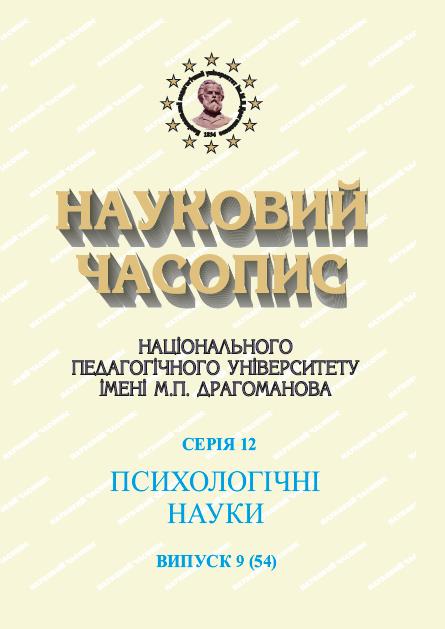THE PHENOMENON OF SELF-ACCEPTANCE AND ITS MANIFESTATION: CONTENT-ANALYSIS OF SELF-REPORTS IN THE FORM OF ESSAYS
DOI:
https://doi.org/10.31392/NPU-nc.series12.2020.9(54).04Keywords:
self-acceptance, structure of self-acceptance, self-reports in the form of essays, content-analysis, qualitative characteristics of self-acceptance.Abstract
The article presents the research results of a wide range of self-acceptance phenomenon manifestations as a multilevel personality trait, which reflects the person degree and specificity of self-being acceptance. The aim is to discover the qualitative characteristics of self-acceptance, which represents modality (quality and sign – acceptance or non-acceptance) and characteristics in the context of the basic types of the person mental activity: emotional, cognitive and behavioral. The theoretical basis of the research: the continuum-hierarchical concept of personality structure by O. Sannikova, which represents the self-acceptance qualitative characteristics. The main research method: content analysis of self-reports. The subject of the study is the indicators of self-acceptance qualitative characteristics. The content-analysis procedure of self-reports in the form of essays by the theme «Self-acceptance and its manifestations» was carried out in three stages: preparatory, executive and analyticalinterpretative. The analysis identified 274 linguistic units that provide additional information about the psychological content and structure of the personality self-acceptance phenomenon. The sauruses of self-acceptance qualitative indicators were compiled into the corresponding blocks. The emotional block includes the emotionally experience characteristics of personality existence recognition. Indicators of the self-acceptance cognitive parameter present a continuum of traits that reflect a person’s consent to being as they are, in the mind. Behavioral parameter indicators reflect the acceptance or non-acceptance behavioral manifestations. The controlregulatory indicators reflect the degree of control emotional, cognitive, behavioral selfrepresentations and a degree of self-awareness at an individually accepted level. Content analysis has identified personality traits that are hypothetically related to self-acceptance, and selfacceptance factors.
References
- Gurevich, K.M., & Borisova, E.M. (1997). Psihologicheskaja diagnostika [Psychological diagnostics]. Moskva: Izd-vo URAO [in Russian].
- Kostenko, N.V. & Ivanov, V.F. (2003). Dosvid kontent-analizu: Modeli ta praktyky [Content-analysis experience: Models and practices]. Kyiv: Tsentr vilnoi presy [in Ukrainian].
- Maslou, A. (2001). Motivacija i lichnost' [Motivation and personality]. Sankt-Peterburg: Evrazija [in Russian].
- Nebylicyn, V.D. (1976). Psihofiziologicheskie issledovanija individual'nyh razlichij [Psychophysiological studies of individual differences]. Moskva: Nauka [in Russian].
- Pantileev, S.R. (1991). Samootnoshenie kak jemocional'no-ocenochnaja sistema [Self-attitude as an emotional-evaluative system]. Moskva: Izd-vo MGU [in Russian].
- K.R. (2001). Stanovlenie lichnosti. Vzgljad na psihoterapiju [The formation of personality. A look at psychotherapy]. Moskva: Izd-vo JeKSMO-PRESS [in Russian].
- Sannikova, O.P. (2007). Formal’no-dinamicheskie i kachestvennye metaharakteristiki individual'nosti [Formal-dynamic and qualitative metacharacteristics of personality]. Nauka і osvіta. 6-7, 30-33 [in Russian].
- Sannikova, O.P. (2013). Makrostruktura osobystosti: psykholohichnyi opys [Macrostructure of personality: psychological description]. Nauka i osvita. 7/ СХVІІ,7-12 [in Ukrainian].
- Sannikova, O.P. & Hordiienko, І.О. (2018) Psykhodiahnostychna metodyka «Indyvidualna kompozytsiia pokaznykiv samopryiniattia»: perevirka teoretychnoho konstruktu [Psychodiagnostic technique «Individual composition of self-acceptance indicators»: verification of theoretical construct]. Problemy suchasnoi psykholohii: zb. nauk. prats Derzhavnoho vyshchoho navchalnoho zakladu «Zaporizkyi natsionalnyi universytet» ta Instytutu psykholohii imeni H. S. Kostiuka NAPN Ukrainy. 1(13), 140-146 [in Ukrainian].
- Sannikova, O.P. & Hordiienko, І.О. (2019). A.s. Naukovo-metodychnyi tvir «Kompleks metodyk diahnostyky yakisnykh komponentiv samopryiniattia: «Ekspres-diahnostyka yakisnykh komponentiv samopryiniattia»; «Indyvidualna kompozytsiia yakisnykh pokaznykiv samopryiniattia»» [Copyright certificate. Scientific-methodical essay «Complex methods of diagnostics of self-acceptance qualitative components:«Express-diagnostics of self-acceptance qualitative components»; «Individual composition of self-acceptance qualitative indicators»»] № 93758 vid 07.11.2019 [in Ukrainian].
- Fromm, E. (2007). Iskusstvo ljubit' [The art of loving]. Sankt-Peterburg: ID «Azbuka-klassika» [in Russian].
- Chepelieva, N.V. (2013). Metody analizu opovidalnoho tekstu [Methods of narrative text analysis]. Tekhnolohii rozvytku intelektu. 4, 4. http://nbuv.gov.ua/j-pdf/tri_2013_4_4.pdf [in Ukrainian].
- Herbert, J.D., Forman, E.M., & England, E.L. (2009). Psychological acceptance. – General Principles and Empirically Supported Techniques of Cognitive Behavior Therapy/ edited by William O’Donohue, Jane Fisher. (pp. 102-114) URL:https://www.researchgate.net/publication/230745911_Psychological_
acceptance - Williams, J.C., & Lynn, S.J. (2010) Acceptance: an historical and conceptual review. Imagination, cognition and personality, 30 (1), 5-56. https://doi.org/10.2190/IC.30.1.c

